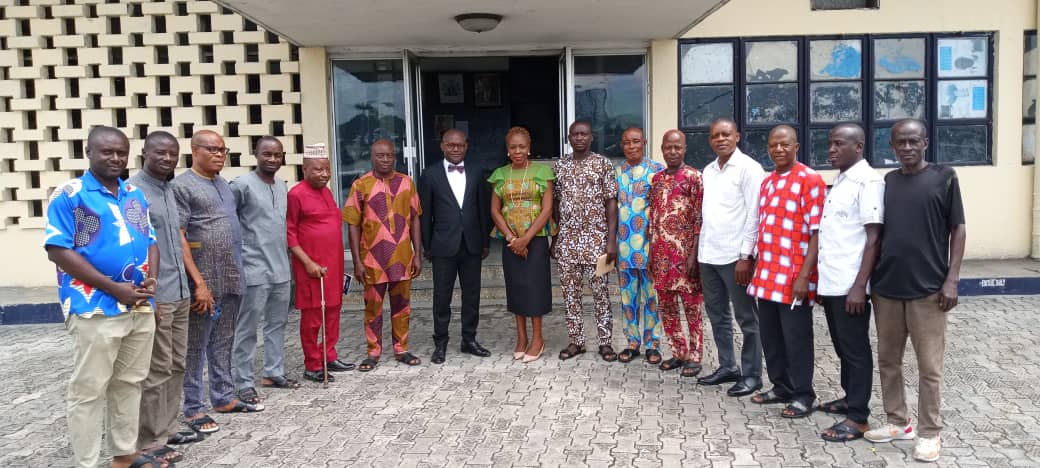Niger Delta
Town Planners Blame Insurgency On Corruption, Bad Governance
Town Planners Registration Council of Nigeria (TOPREC) has blamed the rising level of insurgency in Nigeria on corruption and bad governance.
This was part of the resolution reached at the end of its 2017 mandatory continuing professional education programme in Port Harcourt last week.
The summit with the theme “Insurgency, security and urban safety in Nigeria” also called on Nigerians to support the present administration’s effort towards fighting corruption in the country.
In his address, President of the council, Professor Lay Egunjobi said that the theme of the summit was based on the ongoing security challenges in the country, adding that the unity and corporate existence of Nigeria is presently under threat from insurgent groups operating in the various parts of the country.
“The theme of this year’s training would not have come out a better time than now in view of our collective resolve as a nation to tackle serious insecurity challenges that almost tore the country to pieces.
“You will agree with me that the security of Nigerian states has been under great threat because of the activities of insurgent groups such as Boko Haram in the North east and militant groups and other armed militants such as Niger Delta militants, MOSSOB, OPC, kidnappers, cattle rustlers and Fulani Herdsmen in various parts of the country,” he said.
Also speaking, the national president of the Nigerian Institute of Town Planners, Luka Bulus Achi said that the problem of insecurity in Nigeria calls for concerted efforts by all Nigerians to addresses it.
Achi who was represented by the first vice president of the institution, Lekwa Ezetah said that the summit would provide opportunity for town planners to contribute their quota towards finding lasting solution to the problems of insecurity in the country.
Speaking in an interview with newsmen, Professor Opuenebo B. Owei of Rivers State University said that the Town Planners Registration Council of Nigeria was established in 1988 to regulate the practice of town planning in the country.
Niger Delta
RSNC Head Charges NAOMEW On Professionalism, Effective Service Delivery

The Head of Rivers State Newspaper Corporation, Mrs Stella Dornubari Gbaraba, has charged the National Association of Ogoni Media House Workers (NAOMEW) World Wide, to be committed to professionalism, patriotism and effective service delivery in the discharge of their duties and rendering of patriotic gestures.
Mrs Gbaraba gave the charge yesterday when the NAOMEW, The Tide Chapter paid her a courtesy call in her office in Port Harcourt.
She expressed deep appreciation for the visit, and assured the Association of her commitment to being a worthy Ogoni Ambassador like late Mr Augustine Nwikinaka, former General Manager of the corporation, to promote the fortunes of the corporation, while counting on their unflinching encouragement, prayers and support to succeed.
“ I am very happy to receive the National Association of Ogoni Media House Workers (The Tide Chapter) today in my office. I am glad you people came to my office, for those that know me in a short while in the corporation, I am a serious-minded person. I heard that the time the corporation was functioning well was under the leadership of late Austin Nwikinaka. Any where I go to, I will rather come down and show working example and that is what the Ogoni person is known for. So I am always proud to associate myself with an Ogoni man, so your support means so much to me,” Mrs Gbaraba said.
She assured them of running an open-door policy in the management of the corporation, and urged stronger partnership between NAOMEW, other unions, interest groups, corporate organisations, institutions and the Rivers State Newspaper Corporation in professional service delivery.
Speaking on behalf of the NAOMEW, The Tide Chapter, the National Secretary of the association, Comrade Taneh Beemene welcomed her into The Tide family and also congratulated her on her very important appointment.
Taneh, who expressed confidence in her experience and abilities to deliver on her assignments, thanked her for the uncommon feats recorded in the corporation within her brief leadership. He said the corporation has been revived from its comatose status that predated her appointment.
“ Within your short time, you have given the corporation a remarkable facelift. We pray that God should give you the enablement to restore the dignity of the corporation. We have come to inform you that we are solidly behind you and will make our untiring contributions to make you succeed, “ he stated.
In his vote of thanks and closing remarks, the Chairman, National Union of Printing, Publishing and Paper Production Workers (NUPPPPROW), Comrade Keyirale Donatus Nwiueh thanked the Head of the Rivers State Newspaper Corporation, Mrs Stella Dornubari Gbaraba for receiving the association in a warm manner, adding that she should count on the support of the association to succeed.
Kiadum Edookor
Niger Delta
OBALGA Sole Administrator Presents Brand New Fire Extinguishers To Council …Commiserates With Traders Over Rumuomasi Market Fire Incident …Commences Desilting Of Drainages

The Sole Administrator of Obio/Akpor Local Government Council, Dr Clifford Ndu Walter has presented 150 brand new fire extinguishers to the council.
Dr Walter who spoke to newsmen at the council premises at Rumuodumanya said the gesture was part of measures by his administration to ensure safety of lives and council property from unforeseen fire incidents.
He urged the staff of the council to ensure the safety of the extinguishers, while promising to engage experts to teach them how to handle and operate the extinguishers.
Meanwhile, Sole Administrator of Obio Akpor Local Government Council, Dr Clifford Ndu Walter has commiserated with traders at the Rumuomasi Market over the unfortunate fire incident that gutted parts of the market.
Dr Walter who visited the market to assess the level of damage caused by the fire, described it as unfortunate
Addressing the crowd of distressed traders and community members, Dr. Walter acknowledged the historical significance of the market, which was originally built under the administration of the former Obio/Akpor Chairman and current Minister of the Federal Capital Territory, Chief (Barr.) Nyesom Ezenwo Wike, CON.
He noted that preliminary findings suggest the fire may have been caused by an electrical fault, though a full investigation is still underway.
“As a local government, we will constitute a thorough investigation team to determine the root cause of the fire,
“Most importantly, we thank God that no lives were lost. I want to assure our traders that the Local Government will not abandon you.
“We will also work with security operatives to safeguard salvaged goods and prevent further losses,” he said.
He encouraged traders to adopt stricter safety measures, especially concerning electrical appliances in markets prone to fire hazards.
“There are many ways fires can ignite, even without an open flame. Let us all be vigilant and prioritise safety,” he cautioned.
Dr. Walter also commended those who stepped in to assist during the emergency.
“We are grateful to all who helped salvage goods and support affected persons during the crisis. Your kindness embodies the spirit of Obio/Akpor. The forthcoming investigation will help us put preventive structures in place,” he said.
The Chairman of the market, Mr. Prince Adele, who accompanied Dr. Walter, during the inspection, identified K-Lane as the most severely affected area.
A statement by the information officer to the council, Ominini Leslie Wokoma said no incident of death was reported by the traders during the visit.
In another development, the Sole Administrator of Obio/Akpor local government council, Sir Clifford Ndu Walter, has commenced a comprehensive canal clearance campaign with a view to identifying and removal of all blockages including illegal structures hindering the free flow of waters in the area.
A statement from the council Press Secretary, Ominini Leslie Wokoma said during the inspection of key canals in the area, several unauthorised barricades and blockages were discovered and removed.
According to the statement, Dr Walter emphasised that illegal dumping, unapproved structures and poor drainage habits endanger communities and undermine government efforts, adding that his administration is committed to protecting lives and property of the citizens.
It said the Sole Administrator also declared his readiness to ensure that all canals and drainages are cleaned, maintained and functioning effectively.
He also warned against further dumping of waste in waterways, citing impending flooding.
Niger Delta
EFCC Praises NDDC’S Performance … Unveils Projects In Bayelsa
-

 Editorial17 hours ago
Editorial17 hours agoBenue Killings: Beyond Tinubu’s Visit
-
Business15 hours ago
Nigeria’s Rural Poverty Hits 75% – World Bank
-
Sports17 hours ago
CWC: Bad Blood As Inter Edge River Plate To Advance
-
Business14 hours ago
ANLCA Chieftain Emerges FELCBA’s VP
-
Niger Delta16 hours ago
ISOPLOT Has No Legitimacy to Speak for Isoko, INYA Warns
-

 News12 hours ago
News12 hours agoRSG Tasks Farmers On N4bn Agric Loan ….As RAAMP Takes Sensitization Campaign To Four LGs In Rivers
-
Opinion17 hours ago
Benue Conflicts, Hope At Last?
-
Business15 hours ago
NCDMB Charges Host Community Youths On Relevant Skills Development … As Promoters Handover Oloibiri Oil Museum

